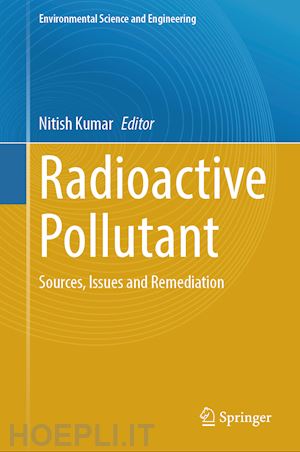
Questo prodotto usufruisce delle SPEDIZIONI GRATIS
selezionando l'opzione Corriere Veloce in fase di ordine.
Pagabile anche con Carta della cultura giovani e del merito, 18App Bonus Cultura e Carta del Docente
This book sheds light on the global environmental issue and proposes solutions to contamination through multi-disciplinary approaches. Radioactivity occurs naturally. Ionizing radiation has always been a threat to humans and all other living things on earth. While the average global readings could be a suitable benchmark for what must be deemed "normal," the natural level of radiation exposure varies by around an order of magnitude for different locations of the earth. Regardless of whether this degree of radiation exposure qualifies as innocuous, it cannot be avoided because some diseases may be caused by exposure to naturally occurring radiation. As a result, these natural exposures serve as the foundation for and comparison point for radiation protection principles such as dose limits or limitations. The majority of the ionizing radiation that the world's population is exposed to comes from natural sources The public receives maximum doses from nuclear sites that are now in normal operation those are typically two orders of magnitude below the background radiation. In industrialized nations, medical uses of radioactivity and ionizing radiation result in mean doses that are comparable to those from natural radiation, but individual doses vary greatly.
This edited book brings together a diverse group of researchers to address the challenges posed by global mass poisoning caused by radionuclides. This book contains three sections. First section describes the different sources of radioactive pollutant in the environment. Second section explains the health risk linked to radioactive pollutant. Third section addresses sustainable remediation strategies of radioactive waste and the potential applications of recent biological technology in providing solutions. This book is a valuable resource to students, academics, researchers, and environmental professionals doing field work on management of radioactive waste throughout the world.
Sources of Radioactivity in the Environment.- Radioactive Pollutant: An overview.- Radioactive contamination of foods.- Radioactive Contamination of the Soil: Assessments of Pollutants Mobility with Implication to Remediation Strategies.- Impact of Radioactive Pollutant on human health.- Possible Health Effects of Radiation Exposure and Contamination.- Nuclear fallout: the mental health consequences of radiation.- Strategies and Practices in the Remediation of Radioactive Contamination.- Phytoremediation of Hazardous Radioactive Wastes.- Recent Strategies for remediation of Radioactive Pollutant: A Review for a Green and Sustainable Environment.- Bioremediation of Radionuclides from the Environment.- Radioactive Pollution: Causes, Effects and Solutions to Nuclear Radiation.- Biotechnological approaches in the Remediation of Radioactive Contamination.- Microbial Solutions in remediation of Radioactive Waste.- Role of biological techniques in management of radioactive waste.
Dr. Nitish Kumar is a senior assistant professor at the Department of Biotechnology, Central University of South Bihar, Gaya, Bihar, India. Dr. Kumar completed his doctoral research at the Council of Scientific & Industrial Research–Central Salt & Marine Chemicals Research Institute, Bhavnagar, Gujarat, India. He has more than 12 years of research and teaching experience in the field of plant and microbial biotechnology and heavy metal bioremediation. He has published more than 70 research articles in leading international and national journals, more than 20 book chapters and 10 books with Springer and Taylor & Francis. Dr. Kumar is a recipient of the Young Scientist Award from the Science and Engineering Research Board (SERB) in 2014 . He has received many awards/fellowships/projects from various organizations, for example, the CSIR, DBT, ICAR and SERB-DST, BRNS-BARC, among others.











Il sito utilizza cookie ed altri strumenti di tracciamento che raccolgono informazioni dal dispositivo dell’utente. Oltre ai cookie tecnici ed analitici aggregati, strettamente necessari per il funzionamento di questo sito web, previo consenso dell’utente possono essere installati cookie di profilazione e marketing e cookie dei social media. Cliccando su “Accetto tutti i cookie” saranno attivate tutte le categorie di cookie. Per accettare solo deterninate categorie di cookie, cliccare invece su “Impostazioni cookie”. Chiudendo il banner o continuando a navigare saranno installati solo cookie tecnici. Per maggiori dettagli, consultare la Cookie Policy.